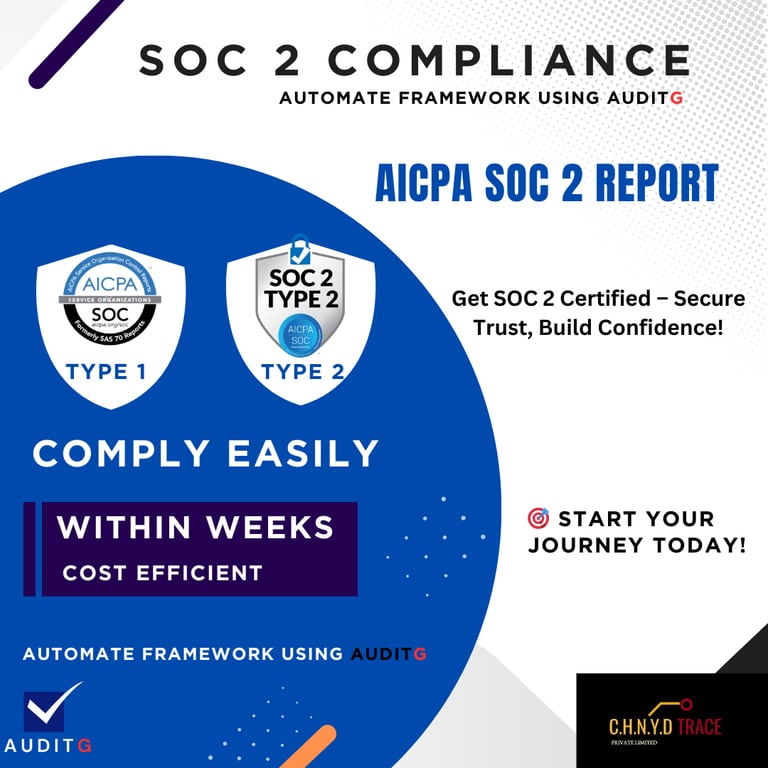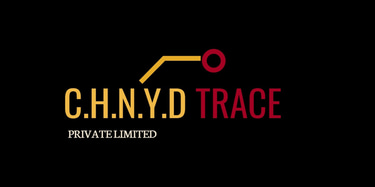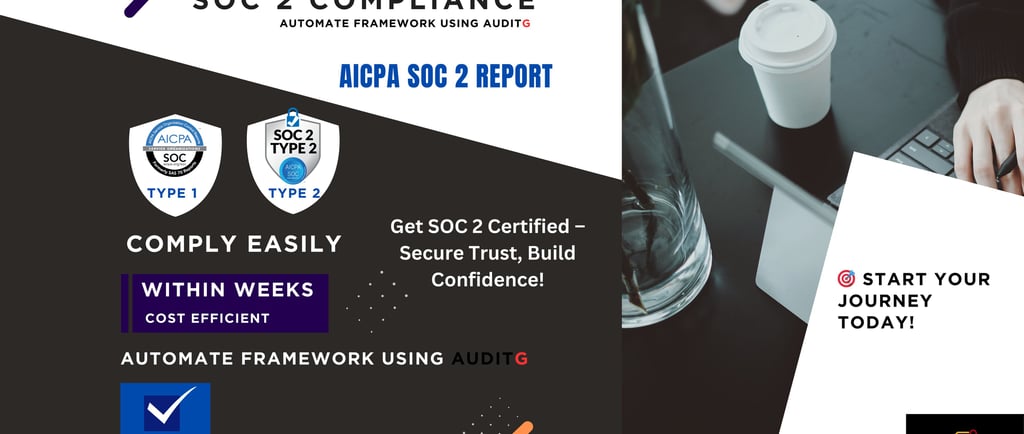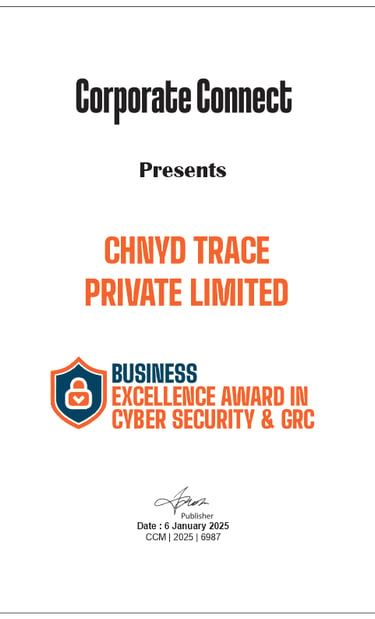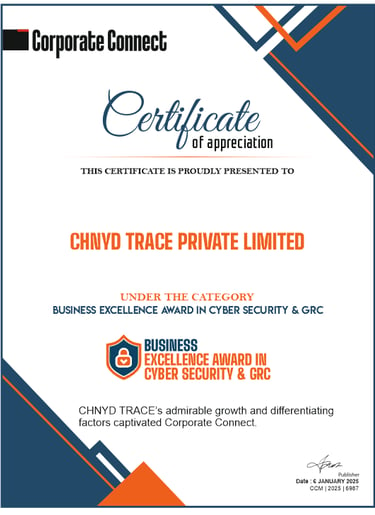soc 2 certification india
SOC 2 Certification India: How Local Companies Can Achieve Global Compliance
SOC 2
11/30/20245 min read
Understanding SOC 2 Certification
SOC 2 certification is a crucial compliance framework that service organizations adhere to, particularly those dealing with sensitive customer data. Developed by the American Institute of Certified Public Accountants (AICPA), SOC 2 emphasizes the importance of managing data according to the principles of security, availability, processing integrity, confidentiality, and privacy. This certification is essential in today's data-centric environment as it helps firms demonstrate their commitment to data protection and build trust with clients and stakeholders.
There are two main types of SOC 2 reports: SOC 2 Type I and SOC 2 Type II. The SOC 2 Type I report evaluates the design of the organization's controls at a specific point in time, assessing whether they are suitably designed to meet the defined criteria. On the other hand, the SOC 2 Type II report extends this evaluation over a designated period, typically ranging from six months to a year, thus assessing not only the design but also the operational effectiveness of the controls in place. The distinction between these two reports is significant for organizations as it influences how they communicate their controls and mitigation strategies to clients.
The assessment of SOC 2 certification hinges on five key principles: security, which pertains to protecting systems against unauthorized access; availability, ensuring systems are operational and accessible as expected; processing integrity, guaranteeing that system processing is completed accurately; confidentiality, safeguarding sensitive information from unauthorized disclosure; and privacy, emphasizing the handling and protection of personal information. By achieving SOC 2 certification, organizations in India can enhance their global reputation and reassurance, fostering long-lasting relationships with clients while also adhering to best practices in data security and compliance.
The Importance of SOC 2 Certification for Indian Companies
In an increasingly interconnected global marketplace, Indian companies must prioritize trust and security to compete effectively. SOC 2 certification serves as a vital metric for organizations that handle sensitive data, particularly in sectors such as IT services, cloud computing, and financial technology (FinTech). This certification validates a company’s commitment to maintaining high standards of security, availability, processing integrity, confidentiality, and privacy, thereby addressing potential security concerns among clients and partners.
For Indian organizations, particularly those targeting international clients, achieving SOC 2 certification can significantly improve customer confidence. Prospective clients are often more inclined to partner with organizations that demonstrate compliance with recognized standards. This trust factor is crucial, as businesses continually seek to mitigate risks associated with data breaches or service outages. By showcasing SOC 2 compliance, Indian companies can differentiate themselves from competitors who may not have equivalent assurance mechanisms in place.
Moreover, aligning with SOC 2 can help Indian companies meet the stringent regulatory requirements set forth by global markets. Through standardized compliance frameworks, firms can ensure that they are adhering not only to local laws but also to international standards, thus facilitating smoother negotiations with foreign clients and partners. As legal and regulatory landscapes evolve, this alignment can serve as a strategic asset in enhancing business viability.
Several notable Indian companies have successfully attained SOC 2 certification, marking a significant milestone in their operational excellence and market competitiveness. For instance, prominent IT service providers have incorporated SOC 2 into their client engagement strategies, showcasing their dedication to securing client data and enhancing service trust. The successful navigation of the SOC 2 certification process illustrates not only the operational commitment of these organizations but also their alignment with global best practices, reinforcing the importance of compliance in building a trust-based economy.
Steps to Achieve SOC 2 Certification
Achieving SOC 2 certification is a comprehensive process that requires careful planning and execution. Here are the essential steps that Indian companies must follow to obtain this important compliance credential.
The first step is to perform a readiness assessment. This initial phase involves evaluating existing policies, procedures, and controls against the SOC 2 requirements. Companies should identify any gaps and areas needing improvement. Engaging stakeholders from various departments can facilitate a thorough assessment and provide a holistic view of organizational readiness.
Next, defining the scope of the audit is critical. This process entails specifying which services and systems will be included in the SOC 2 audit. A well-defined scope not only aligns expectations but also mitigates risks by focusing on relevant systems crucial for safeguarding customer data.
Once the scope is determined, the implementation of necessary controls follows. This step involves establishing and documenting security policies and practices, which may include access controls, incident response procedures, and data encryption protocols. Proper documentation of these controls is essential for demonstrating compliance at later stages.
After implementing controls, conducting internal audits is the next priority. These audits serve as a review mechanism to ensure that policies are being adhered to and that controls are functioning as intended. This step can help identify issues early and provide an opportunity for corrective actions before the final auditor's assessment.
Engaging with a certified auditor is fundamental in this journey. Selecting an experienced auditor who understands the specific needs of an Indian company and can offer guidance on best practices will be invaluable. This relationship can help clarify expectations and streamline the audit process.
Finally, the organization will undergo a final audit. This is where the auditor assesses the company’s controls and compliance with the SOC 2 framework. It is crucial to prepare thoroughly for this stage, ensuring all documentation and evidence are readily available for the auditor’s review.
By following these steps, Indian companies can effectively navigate the path to SOC 2 certification, ultimately achieving compliance and enhancing their credibility in the global marketplace.
Challenges and Solutions in the Certification Process
Achieving SOC 2 certification is essential for companies in India seeking global compliance, but several challenges may impede this journey. One significant hurdle is the lack of awareness among organizations regarding the SOC 2 framework. Many businesses, especially smaller ones, may not fully understand the requirements or the benefits of obtaining this certification, which can lead to a lack of motivation to pursue it. This gap in knowledge often results in companies delaying the necessary steps toward compliance.
Resource constraints represent another common challenge. Many organizations, particularly startups and medium-sized enterprises, often struggle to allocate sufficient financial and human resources for the entire certification process, which includes risk assessments, implementing controls, and drafting required documentation. As a result, processes may remain inadequate or even overlooked, further complicating compliance efforts.
Inadequate documentation of processes also poses an obstacle. Accurate and thorough documentation is vital for demonstrating compliance with SOC 2 standards. Organizations may lack structured methodologies for documenting operational procedures, which can negatively impact their certification efforts.
To address these challenges, several solutions can be implemented. First, investing in training programs can greatly enhance awareness and understanding of the SOC 2 certification process among employees. Training sessions led by experienced professionals can demystify the requirements and illustrate the benefits of compliance.
Secondly, leveraging technology for compliance management can streamline processes and ensure thorough documentation. Various tools can assist organizations in managing risk assessments, documenting processes, and monitoring controls effectively.
Finally, collaborating with experienced consultants can provide organizations with the necessary expertise and guidance to navigate the certification landscape. These professionals can offer insights tailored to the unique circumstances of Indian companies, thereby facilitating a smoother path to SOC 2 certification and ensuring that organizations meet the necessary standards for global compliance.
Contact Us for SOC 2
Reach out for SOC 2 Type 2 certification inquiries and AICPA attestation details. We're here to assist you with your compliance needs.
